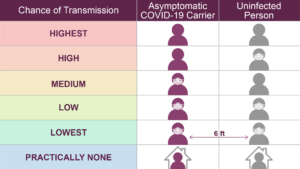Mark Rivett posted July 13, 2020
Nobody is immune to COVID-19, and we cannot afford to go backward.


- Physical distancing is a proven way to slow the spread of illnesses.
- It is an action that has been used throughout history when treatments and vaccines were not available.
- It’s simple. Whether you are at the beach, a neighborhood park, in a meeting or at a store, stay at least six feet away from one another.
- Avoid contact with people who are sick.
- That also means stay home if you are sick and get tested.
View all Coronavirus-related Executive Orders and Directives here.
Category: All News and Events, State News and EventsComments Off on Stay Careful Michigan: Physical Distancing
Mark Rivett posted July 10, 2020
Nobody is immune to COVID-19, and we cannot afford to go backward.

For now, masking up and continuing to stay 6 feet from others are our best chances to avoid bringing the virus home, keep your schools and workplaces open, and contain COVID-19.
Masks and face coverings have been a helpful way to slow the spread of many diseases for hundreds of years. Masks and cloth face coverings can greatly reduce the chance of spreading COVID-19.
It’s one easy action we can take, but we have to be in this together.
You might feel healthy, but the reality is this: about 40% of people who have COVID-19 may be asymptomatic.
View all Coronavirus-related Executive Orders and Directives here.
Category: State News and EventsTags: Stay Careful Michigan | Comments Off on Stay Careful, Michigan: Masks
Mark Rivett posted June 23, 2020
Read Full Story on DBuisness
The Michigan State University Extension Center for Local Government Finance and Policy and Michigan State University Extension (MSUE), both in East Lansing, are partnering with finance experts from around the state to produce fiscal strategy memos and guides to assist local governments in navigating the new environment produced by the COVID-19 pandemic.
The first resource memos cover topics such as budget strategies using federal CARES Act funds, strategies for short- and long-term fiscal sustainability, strategies for managing operating expenses and spending cuts, and the potential effects on property taxes.

Stephanie Leiser; Ford School Lecturer in Public Policy
“This crisis, combined with the ongoing municipal funding challenges in Michigan, will require an even greater effort on behalf of local officials and administrators to quickly assess resources, respond to changing policies and legislation, and develop the tools and insights to maintain sustainable operations and budgets,” says Stephanie Leiser, leader of CLOSUP’s Local Fiscal Health project.
Read Full Story on DBuisness
Category: All News and Events, State News and EventsComments Off on Michigan State and University of Michigan Partner to Develop COVID-19 Fiscal Strategy





